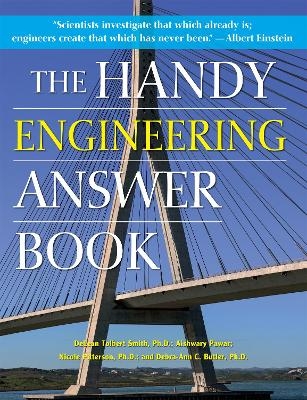
The Handy Engineering Answer Book
Visible Ink Press (Verlag)
978-1-57859-770-3 (ISBN)
handy resource on the fundamental facts about engineering for both
engineers and non-engineers alike, whether you are exploring
engineering for the first time, already have a strong background, or
fall anywhere in between.
Engineering
impacts every aspect of our lives. Bridges, buildings, buses,
electrical grids, computers, televisions, refrigerators, vacuum
cleaners, and virtually any everyday household item needs to be
engineered to function properly. Fundamentally, engineering is about
identifying a need and developing solutions that meet that need.
Throughout history, engineering ideas and innovative feats have
provided solutions to many challenges faced by civilizations. From
the Great Wall of China to NASA's space program, The
Handy Engineering Answer Book covers
the history of the field, details the lives of key figures,
introduces the tools engineers use to solve problems, and provides
fun facts and answers to a thousand important and interesting
questions, such as ...
What
is the difference between science and engineering?
What
do engineers do?
What
are some famous engineering mistakes or failures?
What
is reverse engineering?
What
is a prototype?
What
types of jobs do electrical engineers do?
How
does a car battery work?
What
are the major job responsibilities of a HVAC engineer?
What
is a Powertrain?
What
is Bernoulli's principle?
What
are the Laws of Thermodynamics?
What's
the difference between 2-stroke and 4-stroke engines?
What
is stress and strain?
What
is the difference between torque and power?
What
is automation?
What
is quality assurance?
What
is meant by outsourcing?
What
are the responsibilities of a construction manager?
What
are the types of road construction that are both durable and
cost-effective?
Which
materials are used to build a cruise ship?
What
are some design elements that help structures withstand earthquakes?
How
does a civil engineer design water slides for theme parks?
Who
was W. Edwards Deming?
What
is ergonomics?
What
is biomedical engineering?
Who
is Grace Hopper?
What
is debugging?
What
is the difference between a web developer and a website designer?
Was
Leonardo da Vinci an aerospace engineer?
Where
do chemical engineers work?
How
much energy does the world use?
What
are the major challenges addressed by environmental engineers?
What
is humanitarian engineering?
What
is acoustical engineering?
What
are the required skills for fire engineers?
What
are the advantages and disadvantages of nanotechnology?
With
more than 140 photos and graphics, this fascinating tome is richly
illustrated. Its helpful bibliography and extensive index add to its
usefulness. Whether using science and math or building prototypes for
testing or the development of various subdisciplines, it looks at how
fundamental engineering is to modern life and society!
DeLean Tolbert Smith, Ph.D., is an assistant professor in the Industrial and Manufacturing Systems Engineering department at the University of Michigan-Dearborn. She earned her Ph.D. in engineering education from Purdue University, and her research led to a National Science Foundation CAREER award, Investigating Black Youths' Engineering, Innovation, and Design Practices at the Intersection of Museum and Home/Family Learning. She hails from Detroit and currently resides there. Aishwary Pawar is doctoral candidate in industrial & systems engineering at the University of Michigan-Dearborn. His research is focused on creating a customized Integrated Education Plan application, and he is developing a data dashboard for real-time monitoring of student personal and demographic data. A graduate student instructor at the University of Michigan-Dearborn, he teaches lab sessions in engineering and engineering design and resides in Bloomfield Hills, Michigan. Nicole P. Pitterson, Ph.D., is an assistant professor in the Department of Engineering Education at Virginia Tech. She earned her bachelor of science in electrical and electronic engineering from the University of Technology, Jamaica, a master's of science in manufacturing engineering from Western Illinois University, and a Ph.D. in engineering education from Purdue University. She currently lives just west of Roanoke, Virginia. Debra Butler, Ph.D., received her bachelor of arts from the University of Miami and her Ph.D. in educational policy, planning, and leadership with a focus on higher education from the College of William and Mary. Debra currently works in engineering and computer science graduate education academic affairs. She is a first-generation immigrant and first-generation college graduate. Debra's the wife to a retired Army officer and mother of two beautiful daughters. She currently resides in Canton, Michigan.
About
the Authors
Acknowledgments
Introduction
1.
Introduction to Engineering and History
2.
Engineering Design Process and Innovation
3.
Electrical Engineering
4.
Mechanical Engineering
5.
Manufacturing Engineering
6.
Civil and Architectural
7.
Industrial Engineering
8.
Biomedical Engineering and Bioengineering
9.
Computer Engineering and Computer Science
10.
Aerospace Engineering
11.
Chemical Engineering
12.
Interdisciplinary Engineering and Engineering Grand Challenges
13.
Engineering Pathways
Appendices
Engineering
Organizations
Summer
Programs and Camps
Programs
for elementary school students
Programs
for college students
Engineering
Equations
National
Society of Professional Engineers Code of Conduct
Further
Reading
Index
| Erscheinungsdatum | 20.09.2022 |
|---|---|
| Zusatzinfo | Illustrations |
| Verlagsort | Canton |
| Sprache | englisch |
| Maße | 180 x 234 mm |
| Themenwelt | Geschichte ► Teilgebiete der Geschichte ► Technikgeschichte |
| Technik | |
| ISBN-10 | 1-57859-770-6 / 1578597706 |
| ISBN-13 | 978-1-57859-770-3 / 9781578597703 |
| Zustand | Neuware |
| Haben Sie eine Frage zum Produkt? |
aus dem Bereich


